












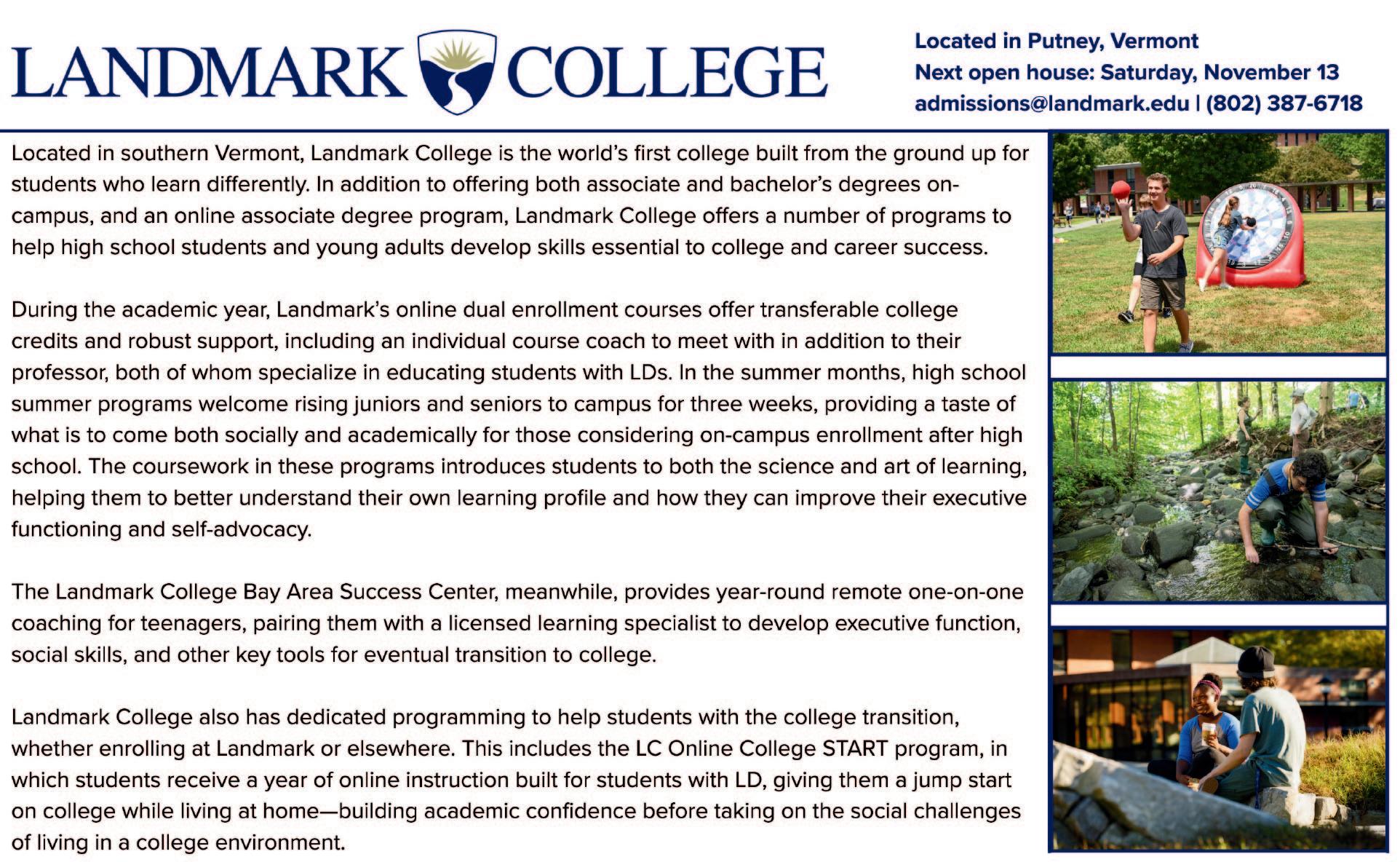


















College application essays are often the most stressed about component of the admissions process, but they don’t have to be! By taking some time to learn what admissions officers are looking for students can feel confident when crafting their college application essays.
When it comes to writing compelling essays, students need to keep a few simple tips in mind in order to approach the process in a stress-free manner. Here are three simple tips from former admissions officers on what to keep in mind when finishing up your college application essays.
Let admissions officers get to know you Colleges are looking to really get to know the applicant in their essays. There is only so much that an application reader can learn from a list of extracurricular activities, transcript, test scores, recommendation letters, and other application materials.
Often, the best way to get a clear picture of a student’s goals, accomplishments and character is to hear it directly from the student. Essays offer students a chance to share something with admissions officers that they don’t already know, and also offer students an opportunity to demonstrate their interest in a school. Students shouldn’t regurgitate information that’s already available—they should reveal something that can’t be found anywhere else in the application.
Be detailed in supplements
For certain school-specific essay questions, or the common “why this school?” question, students should get specific. Colleges are looking for really detailed and well-researched responses here. It’s not enough to say, “I want to go to XX University because it’s a great school.”
Colleges want to know that a student has done their homework on the institution and has really thought about how they will fit into the campus community. This is referred to as informed interest. Students should mention specific courses or professors of interest. They can elaborate on campus organizations or programs that fit certain goals, and certain aspects of the campus community that make it a good social and academic fit. Admissions officers should be able to clearly see where a student might fit into the fabric of the community based on their answer to this question.
Use AI thoughtfully
The majority of colleges and universities in the U.S. don’t have clear guidelines about how prospec-
tive students can use AI tools like ChatGPT in their essays and personal statements. However, this doesn’t mean that AI can write your essays for you.
The purpose of college application essays and personal statements is to give colleges a deeper look at who you are — what matters to you, what you’re passionate about, and what excites you about the future. ChatGPT doesn’t know any of that! It’s up to you to tell your story.
Your college application essay should reveal something about you through storytelling. If you’re having trouble deciding what to write, you can turn to ChatGPT to help you generate ideas and narrow down your topic.
For example, you can ask it to come up with 10 questions to help you brainstorm topics or to elaborate on an idea you might already have. You know yourself the best, so while ChatGPT can help start your idea, it’s up to you to finish it.
Avoid common mistakes
There are simple mistakes that students make every year when it comes to their college application essays. It’s important to keep an eye out for these simple mistakes and work to resolve them before submitting your final applications.
Some common mistakes students make in their college application essays include:
Trying to sound like someone else or writing about things they think admissions readers what to hear. Students want to find the best-fit school for them and that means they need to be authentic in their applications.
Not proofreading. Another huge mistake students make is to not do that final read-through to catch any last spelling or punctuation errors. You don’t want to work hard on your essay and then leave the reader wondering if you truly meant “marital” arts over “martial” arts.
Copy and pasting. Supplemental essays should all be unique and focused on the school you are applying to. Don’t copy the essay you wrote for Tufts and try to apply it to Hamilton.
College application essays aren’t rocket science but they are an important part of the admissions process that students need to invest a good amount of time and effort into. If you’re struggling with your college application essay.

The average admission counselor may read over 50 applications per day. Therefore, an admissions counselor could potentially review at least 1,000 sheets of paper in a single workday, and your essay may be one of those 1,000 sheets of paper. How will your college admission essay get noticed? Distinctive detail.
The goal of an admissions essay is to transform yourself from a threedimensional person into a two-dimensional text. The best way to create this transformation is through distinctive detail.
Generally speaking, admissions counselors are detail-oriented people. They will notice details if you take the time to make them distinctive. Exactly what are distinctive details though?
It’s in the details
Distinctive details describe you beyond what admissions counselors can see in your application: your idiosyncrasies, oddities, and hopes and dreams. For example, you may write that you like M&Ms, but you may also want to write that you like the blue M&Ms better than the red M&Ms. You may express that you cannot stand most poetry in English, but you might also want to mention that you love poetry in French. Students should aim to write something heartfelt and memorable; however, sheer shock value rarely works in the applicant’s favor.
When writing any piece of your college admission essay, you should strive to evoke emotion from the reader. Laughter and crying are two that may be useful to use.
Admissions counselors are also looking for intellectual curiosity in students. They want someone who their peers find stimulating inside and outside the classroom. Intellectual curiosity can be found in college admission essays through use of distinctive detail as well.
For example, rather than mentioning your academic interest in science, explain your specific interest in researching tuberculosis. When describing your interests outside of school, rather than writing you like to watch movies with friends, share how you enjoy watching I Love Lucy re-runs with your friends while drinking Mountain Dew.
Whatever topic you choose to write about, remember to use distinctive detail. It will make your college admission essay stand out and get noticed!
decision time.

Hofstra University is climbing the ranks, recognized among the nation’s top colleges in the 2026 U.S. News & World Report Best Colleges rankings as Long Island’s second highest ranked university and a Top 100 Best Value School. Hofstra has also achieved the Research 2: High Spending and Doctorate Production University (R2) designation from the Carnegie Classification of Institutions of Higher Education, reflecting its world-class faculty, expanding doctoral programs, and growing research enterprise.
Beyond rankings, Hofstra offers a deeply personal learning environment. You will learn and grow on a campus that features engaging classes, exceptional facilities, dedicated faculty, and a supportive network of peers and mentors. With 175 undergraduate programs, Hofstra combines the closeknit feel of a small college with the international reach, reputation, and resources of a major university.
Through career-focused experiences, Hofstra connects students with professional opportunities. Partnerships with leading companies open doors to internships and co-op positions, contributing to 92 percent of graduates being employed or in graduate school within a year. Students also benefit from small classes, with a 13 to 1 student
faculty ratio, where professors who are leaders in their fields are dedicated to teaching and mentoring.
The student body reflects Hofstra’s values. Among full-time, first-year students who started in fall 2024, all with financial need received aid. Nineteen percent were in the top 10 percent of their high school class, and 61 percent self-identified as people of color.
Hofstra’s 244 acre campus includes the new Science and Innovation Center, while collaborations such as with Northwell Health provide handson clinical experiences and career pathways. Across its schools in business, communication, education, and the arts and sciences, Hofstra offers nationally recognized programs that prepare students for the jobs of tomorrow with opportunity, innovation, and personal attention.
Looking ahead, Hofstra continues to embrace innovation. The University is preparing its community for the future by giving all students and faculty access to powerful AI tools and training through partnerships with leading technology companies. Hofstra is leading the way in AI innovation as the first institution on Long Island to launch ChatGPT Edu campuswide.
This commitment also extends to equity and access. Hofstra has been

named a 2025–2026 FirstGen Forward Network Champion, one of only 18 institutions nationwide recognized for advancing first-generation student success. This designation highlights Hofstra’s strong support systems, including mentoring, academic resources, and community programs that boost retention and graduation rates, making the University a national model for firstgeneration achievement.
Ultimately, Hofstra is a place where
students thrive. Experience outstanding academic programs, personal attention, and a vibrant campus life with more than 200 student clubs, 21 NCAA Division I athletic teams, and most importantly, a community that cares about you and your dreams. Visit hofstra.edu/visit to learn more.








Join us for one of the following tour dates:
Sunday, October 26, 2025
Sunday, November 9, 2025
Tours are available at 9 a.m. and 11 a.m.
With more than 175 undergraduate and 200 graduate program options, Hofstra University has something for everyone. Discover your passion in classes taught by distinguished faculty in state-of-the-art facilities. Build momentum toward your career with professional experiences through internships or coop programs. Find your people as you explore over 200 student clubs and organizations on a vibrant campus. At Hofstra, your future is set in motion.
In-person and virtual tours are available. For event details and to RSVP, visit hofstra.edu/foh



The college admissions landscape has no doubt changed dramatically over the last few decades, and especially in the years post-pandemic. Most universities went test-optional or test-blind, SAT subject tests flatlined, and the writing section of the SAT perished along with it. On the admissions front, a few students chose to opt for alternate pathways instead of pursuing expensive college degrees. Even for college counselors who are constantly tracking college admission updates, it can sometimes be challenging to keep up.
It’s important for college-bound students to stay up to date on the latest college admissions trends. Here some things college advisors have seen this year, and what to watch as these trends shape admissions going forward.
Throughout the college admissions process, doing your due diligence is essential. The more students know about the process, the better prepared they will be to make decisions that align with their needs and goals.
Early applications to some of the most highly selective schools decreased for the 2024-25 admissions cycle, likely due to the reinstatement of standardized test requirements. Brown and Yale, for example, reported fewer early applications compared to the 2023-24 admissions cycle.
Other top schools, however, reported higher numbers of early applications, including Emory, Duke, Northwestern, and UPenn.
These schools maintained their test-optional policies for 2024-25. Of these schools, only UPenn at this time has reinstated testing requirements for the upcoming admissions cycle.
Students who apply Early Decision or Early Action often have a statistical advantage over students who apply Regular Decision. Why? Colleges and universities help maintain or improve their yield rates by accepting more students in the early rounds.
The number of test-optional schools is now on the decline, with many private and public schools — including most of the Ivy Leagues — reinstating standardized testing requirements. Test scores are better than high school grades at indicating a student’s academic preparedness for college and chance for success. And because grading standards are inconsistent, colleges use standardized tests to level the playing field.
The ACT made changes to its digital test in April 2025 — most notably, making the Science section optional. However, watch for schools that may require or recommend that students take the Science section. Boston University, for example, announced that students who submit ACT scores for the 2025-26 admissions cycle will be required to include


their science section scores.
Additionally, the whole test is shorter, as is each individual section. The overall test time is now 125 minutes, compared to the previous 175 minutes. Students also have an average of 10 additional seconds to answer each question, but this varies by subject.
These changes were implemented on the paper test in September 2025. It’s worth noting that the ACT will remain linear, meaning the questions on the test will not be adaptive as they are for the digital SAT.
Another recent trend is the addition of a college application video at some schools, allowing students to share more about them-
selves and their voices beyond the information provided in the rest of their application. Schools that have incorporated videos into the application process include Bowdoin College, WashU, Brown, Case Western, Duke, Vanderbilt, UChicago, and more. Each school has different requirements. In some cases, they are looking for a video introduction. In other cases, it might be a video essay. These videos are often optional, but we always recommend submitting them. College admissions officers want to get to know who you are as a person — not just as an academic
Photo: If you take the time to do your research and keep yourself open to a wide range of colleges and universities, you’re bound to find many college options that will be right for you .

Founded in 1932, and located in New York City, Vaughn College is a private, nonprofit, four-year college that enrolls more than 1,400 students in master’s, bachelor’s and associate degree programs in engineering, technology, management and aviation.
Vaughn College was ranked number one in upward mobility among 2,137 colleges according to a study reported in 2017 in The New York Times meaning Vaughn is fulfilling its mission by moving students from the bottom 40 percent to the top 40 percent in income. The College was recognized in the top four percent of colleges with the highest return on investment for students from under-resourced communities by a 2022 study completed by Georgetown University’s Center on Education and the Workforce. Vaughn continues to be recognized as a top regional college in the Northeast and a top college for social mobility by US News and World Report.
Vaughn houses a flight simulator complex and works with a flight training partner to enable students to pursue Federal Aviation Administration (FAA) flight certifications and ratings. The College also operates an air traffic control simulation laboratory that allows students to train on the same state-of-the-art equipment used by the FAA and is one of a select group of institutions approved by the FAA to offer an Enhanced air traffic control program. To meet the high demand for aircraft technicians, Vaughn’s Aviation Training Institute offers an associate of occupational studies in aviation

maintenance along with FAA airframe and powerplant certification.
Visit Vaughn College, email admitme@vaughn. edu or call 1-866-6VAUGHN. Visit Vaughn at Facebook; YouTube; Instagram or on TikTok at @ VaughnCollege to learn more.
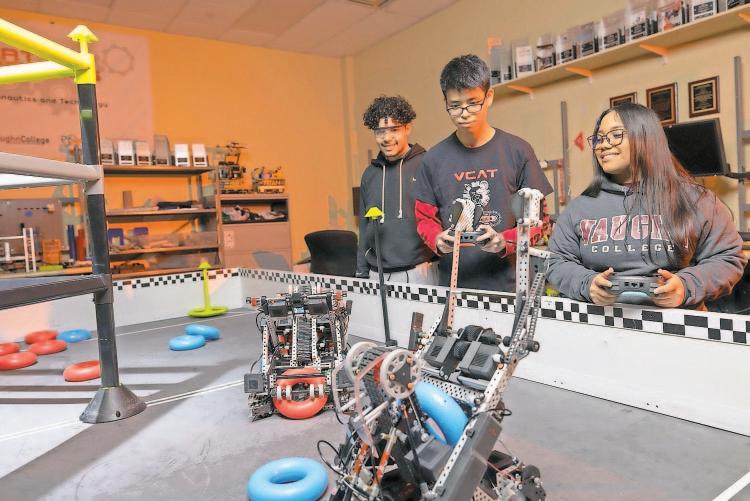

Are you ready to rise above?





Vaughn offers industry-driven programs in engineering, technology, management and aviation, preparing students for in-demand careers in rapidly growing fields. With a 95% job placement rate—78% in their chosen professions—we ensure our graduates are ready to seize these high-paying career opportunities.
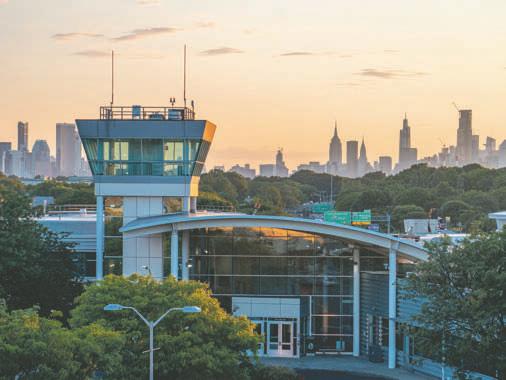
November 15—space is limited, so register today at vaughn.edu
Molloy, where you’ll find a learning style that fits your lifestyle.
“At Molloy University, we provide an education that leads to success in areas that include the health professions, arts and sciences, education, and business, rooted in the liberal arts to develop critical thinkers who are prepared for the future,” said President James Lentini. “This is why they graduate and find success individually and professionally. Inspired by the Catholic, Dominican tradition, we welcome a diverse community of students and reach beyond the classroom to educate the entire person.”
A small student-to-faculty ratio (10:1) means that students are more than a number to our professors, who go above and beyond serving as mentors to students. Molloy makes it easy to earn a degree, offering flexible learning options and resources for transfer students, career changers, and veterans..
Students can earn degrees (some fully online) in a variety of outstanding academic programs that lead to rich and rewarding careers. Classes are taught by an accomplished and innovative faculty who are always approachable.
Molloy also offers a variety of graduate and doctoral programs that allow students to further enhance their careers or take a new direction while pursuing their passion. These programs include a variety of MBA options, as well as programs in clinical mental health counseling, criminal justice, music therapy, speechlanguage pathology, education, and nursing. We also offer professional certificates and continuing education options.
During their time at Molloy, students have opportunities to take part in internships, experiential learning opportunities, capstone projects with realworld clients, and exciting research projects.
Molloy was recently recognized as one of Money Magazine’s 2025 “Best Colleges,” receiving a coveted 4-star rating. The University was ranked #1 on a list of the “Safest Colleges” in New York State and #3 in the United States. Molloy was recently named one of the top 50 “Value” institutions in the country by Niche, the only Long Island university or college to earn this distinction, and one of only five Catholic colleges to make this prestigious list.
In addition to being recognized as a great value, Molloy is one of the lower-priced private universities in the region. Approximately 90% of Molloy students receive some form of institutional aid. Additionally, Molloy’s strong retention and graduation rates mean
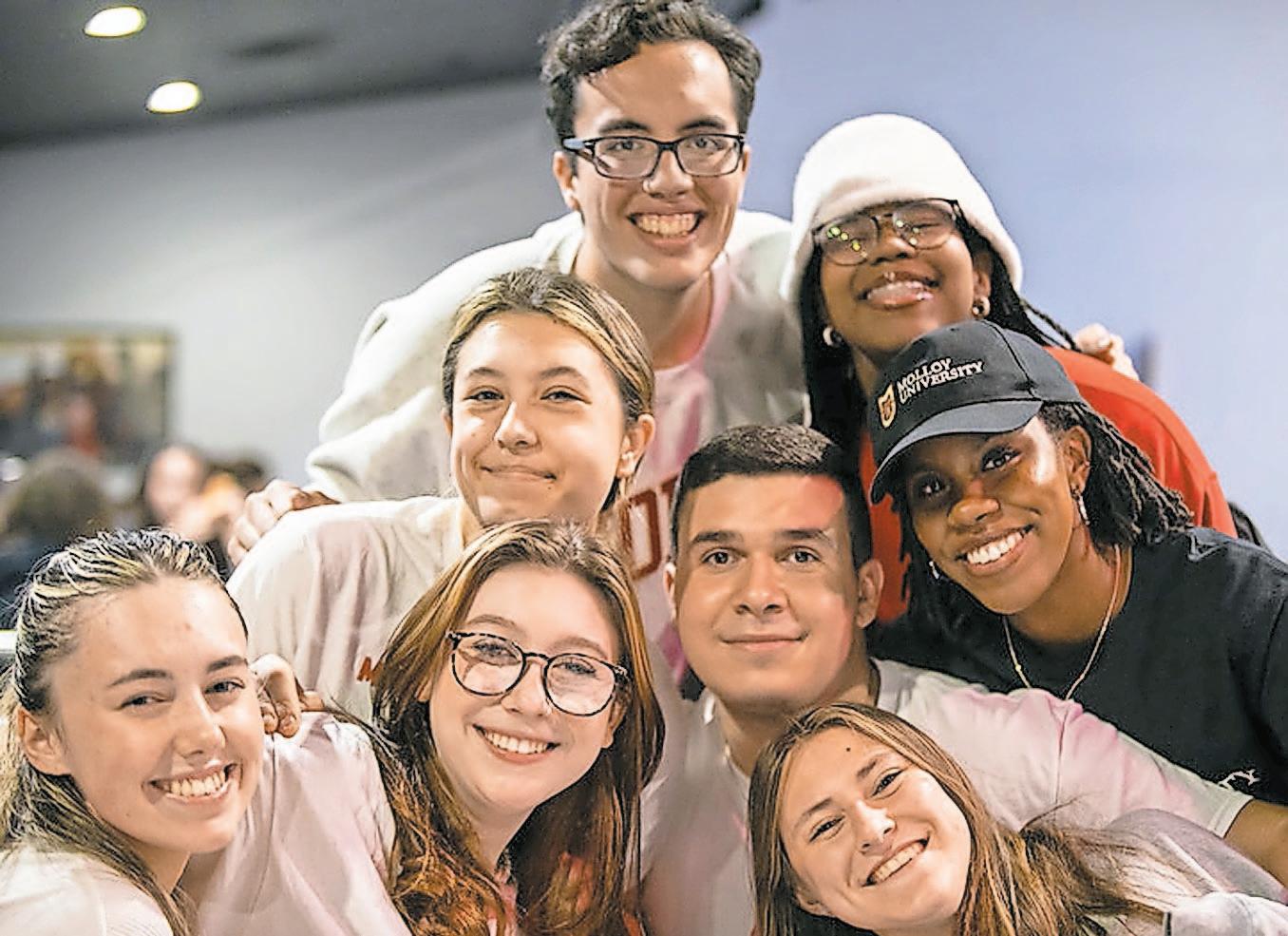
that most students graduate on time.
“We provide our students with the best possible value. If you come to Molloy, you graduate with a job in your field at a salary that’s significantly higher than average.”
- Dr. James P. Lentini, President, Molloy University
One of the many strengths of Molloy is its proximity to New York City. Nestled in the Long Island suburbs just a short ride from Manhattan, Molloy takes advantage of the NYC metro region to provide its students with the highest quality internships and clinical placements. The largest metropolitan region in the country, the NYC metro area is a world leader in healthcare, business and finance, education, criminal justice, performing arts, and much, much more.
We know that you are serious about your education, but not all learning takes place in the classroom. With more than 50 clubs/student associations, evening and weekend activities and trips, a 550-seat theatre, exciting dining options, extensive service opportunities, and popular study and meeting areas, Molloy gives you the opportunity to enjoy yourself and make new friends. Whatever your interest, Molloy has something for you!
Our international education program offers opportunities to travel during a school break or spend an entire semester abroad. Our student trips include destinations such as Spain, Italy, Ireland, and Tanzania. Additionally, Molloy competes in NCAA Division II Athletics and has various club sports teams. Molloy recently added a Sprint Football team that plays against Army, Navy, and Cornell.
Are you interested in living on campus? Molloy’s three residence halls house approximately 350 students and provide energy for a campus already buzzing with activity. Being a campus resident puts everything the University offers right outside your door.
Don’t take our word for it. Visit our campus and see for yourself. At Molloy University, you’ll think about your future in a whole new way and find Where U Belong!
Visit molloy.edu or call Molloy’s new AI recruiter, Mia, to learn more or to schedule an in-person tour. Mia speaks multiple languages and is here to help 24 hours a day, seven days a week!

It all starts with the list
If you want to make a better college search list, don’t limit your potential list of colleges to just schools you have heard of. There are over 1,500 four-year U.S. colleges there is no reason to start off with a short list of five institutions. Having a larger list of colleges opens up opportunities you haven’t even considered at prices you didn’t think possible. Now your college search list is not the same thing as your college application list where five schools is a very reasonable number. The college search list should contain at least 20 schools, more if you have the time to research them. A good search list will include colleges that you haven’t considered or heard of before you started creating the search list. This is the time to be open to new ideas. Pick or imagine your ideal school in every aspect. Go all out and assume you have a full scholarship to attend.
Next, start playing “what if” with the characteristics of this dream school. Would you go if it were 500 miles away? What if it is was significantly smaller than you wanted? Or maybe it doesn’t have the big time college sports you’re looking for? If just one of these factors was missing, would you still attend if you had a full scholarship?
If you would still consider going than you need to realize that these “requirements” you have already created are probably limiting some very good schools from your list. You can start expanding your list by taking one
college you’re interested in and changing or removing a limiting characteristic to find similar schools.
Ultimately, these new schools may not stay on your list. However, it’s more likely that you will discover possibilities that you hadn’t considered and revise the criteria for your list. Finance may still be critical but you might decide that there can be mitigating circumstances as far as size goes.
Here’s some advice on how to expand your college search list.
Ignore geography. This means both location, such as state, and place, such as rural. There are a lot of preconceived notions about colleges based on geography alone. Ultimately, geography may be an important consideration for narrowing your list of colleges. But by keeping geography out of the equation to begin with, you may discover other factors that more than make up for being in a place you had thought was less than desirable.
Don’t use rankings to keep colleges off your list. Rankings are arbitrary, one person’s top ten may not make it to another person’s top 50. If and when you do use rankings to narrow your college search list, be sure to understand the basis for the rankings.
Look at net cost rather than tuition.Few people pay full price. You can get an even better idea of net cost by income level by using the college navigator on college search sites. Make sure you have already calculated an


estimated EFC and use the colleges’ net price calculators.
Don’t use college size in making your preliminary list. This is another area where many students have assumptions that they haven’t really tested. Also, it’s simply a matter of numbers since there are just a lot more smaller colleges than bigger ones. Begin by looking at the percentage of classes by class size or the number or type of classes available for specific majors.
Consider the extracurriculars. College isn’t only about the classroom, so your college criteria should include extracurriculars. Some schools even offer scholarships or other forms of financial aid for incoming students based on their extracurricular interests.
Of course, the number and type of extracurriculars is dependent upon the school community. At many schools, Greek life is active. Most universities have athletics programs, including intramural sports, where stu-
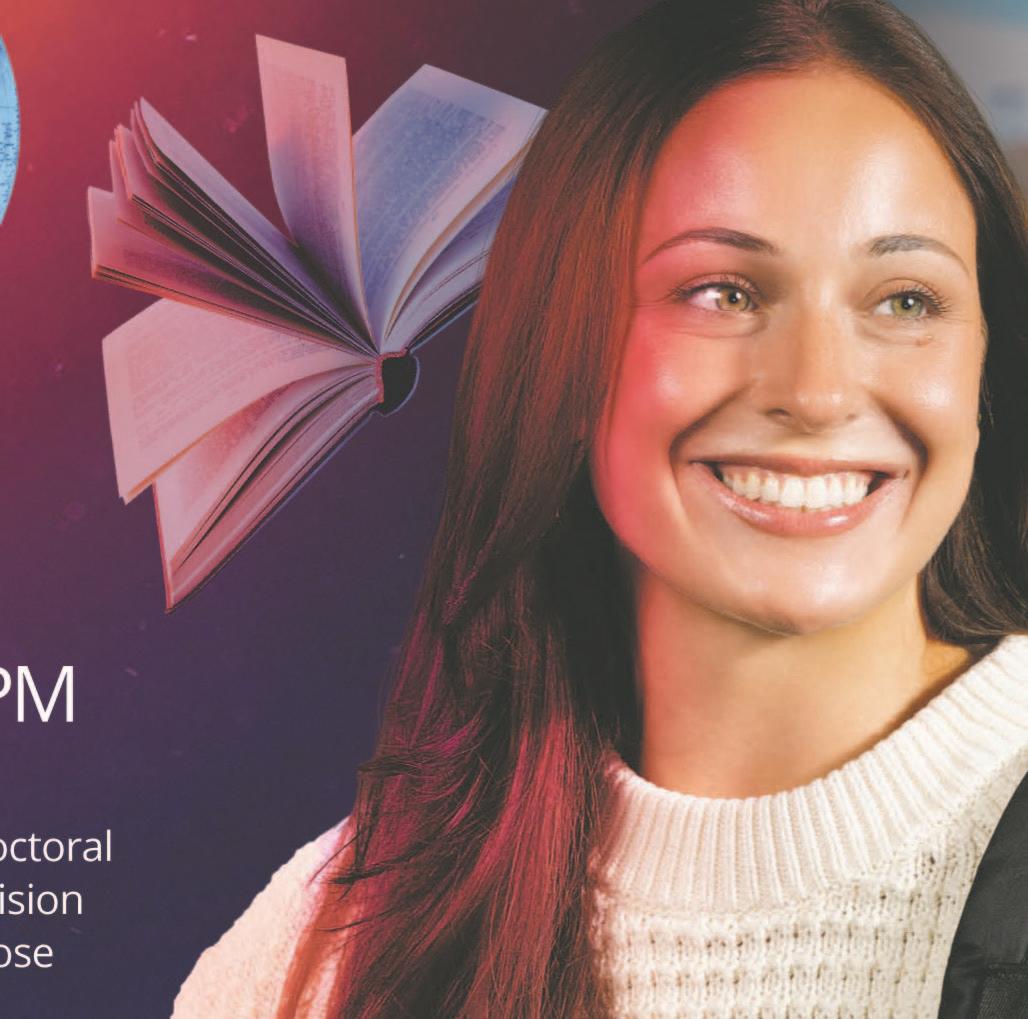

dents can play football, soccer, baseball, or basketball. Many schools also offer more niche sports, like golf, lacrosse, or crew.
Outside of sports, students can join the choir or debate team, participate in volunteer opportunities, or work on theater productions. Most colleges also host special interest clubs.
Consider the other factors. Ultimately, finding the right college for you could boil down to any number of factors or just one big one, depending on your goals. For some students, that factor might be a school’s religious affiliation, while others may look at study abroad opportunities or campus culture to find the best fit.
Photo With so many facets to the college application process, it can be difficult for students and their families to even know where or how to begin. A good starting point — and one of the most important pieces of the application process — is formulating a balanced college list.
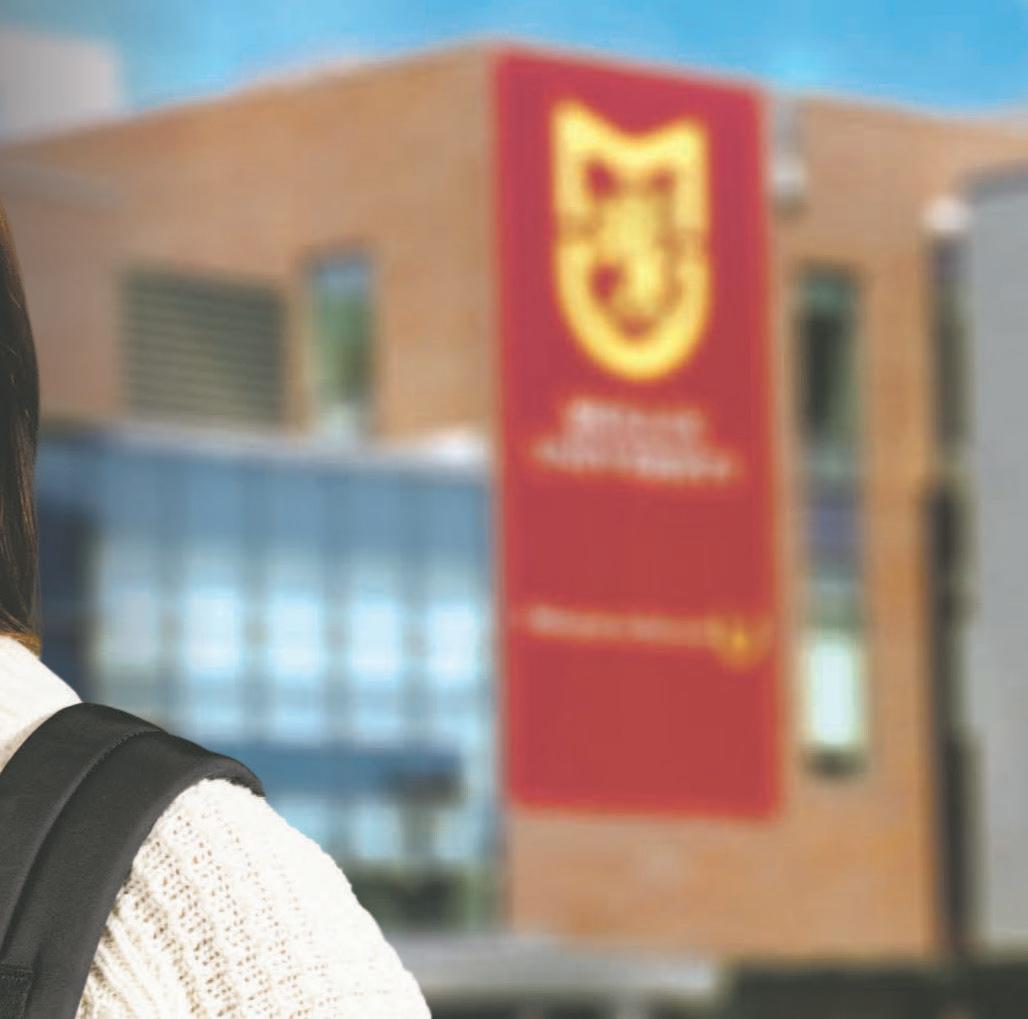


Looking for a career that offers purpose, respect and a future you can be proud of?
If you are an aspiring healthcare hero, your journey to a rewarding career as a registered nurse or medical assistant begins at St. Paul’s School of Nursing, Queens campus.
At SPSON, our instructors bring passion and real-world experience, providing you with valuable learning opportunities and hands-on training. Our Associate Degree in Nursing (ADN) program offers academic and clinical instruction to prepare you for the NCLEX-RN licensure exam. We combine rigorous coursework with hands-on clinical rotations in both inpatient and outpatient settings. Students enrolled in our medical assisting program will gain skills and confidence to help them work alongside doctors, nurses, clinicians, and administrative professionals in a wide range of healthcare settings.

New York City metro area residents can receive hands-on training at Saint Paul’s School of Nursing in Queens to help them launch entry-level employment in the exciting field of healthcare.
Ready to start your future in healthcare? Contact our admissions team today.


Help admissions team to get a clearer picture of the whole applicant
Those teacher recommendation letters might just make the difference between whether or not a student gets into their dream school.
Colleges and universities want to see that their applicants are well-rounded, passionate, and determined. Thousands upon thousands of students can earn a 4.0 GPA, but far fewer students are able to do so while also demonstrating strong leadership skills, advanced critical thinking skills, and impeccable character.
Ideally, choose teachers from junior year. Colleges prefer recommendations from teachers who’ve taught you in junior year because they’re getting a look at your most recent self. You may have had a great relationship with a teacher from 9th or 10th grade, but you’ve probably grown as a student and a person since then. Junior year classes are also more difficult, so colleges learn more about how you handled tougher coursework.







































Schools rely on recommendations from teachers to gain a more holistic view of their applicants, allowing them to see which students have what it takes to thrive on their campus and contribute to the institution. In short, recommendations help you stand out. They showcase your personality and the way you interact in an academic setting.
Teacher recommendations shine a light on a student’s work ethic in the classroom. They also let school representatives provide context about a student’s academic journey that may not come across by looking at a transcript.
It’s advised that students choose two teachers to ask for a recommendation and to go ahead and ask before the end of junior year. It may seem early to ask before applications are open or before you’ve finished your college list but we have a few reasons for wanting to give your teachers plenty of notice ahead of time.
Choose at least one core subject teacher. Your favorite classes might be your electives, but try to think of at least one teacher who teaches a core subject (math, English, social studies, science, foreign language) with whom you have a good relationship. Sometimes, colleges will request that at least one teacher recommendation come from a core subject. Your recommenders’ subjects don’t have to relate to your intended major. So if you want to major in engineering and have a great relationship with your history teacher, don’t feel like you have to ask your math and physics teachers. A letter from that history teacher could provide a great new perspective that would be otherwise missing from your application!
Think about who knows you the best. So if you’re not deciding solely based on your highest grade or subject area, how do you decide? Think about the strength of the relationship you have with your teacher. Remember, recommendations are someone else writing about you. You want to choose teachers who have something to say!






First, some teachers prefer to write recommendations over the summer when they have more free time. Writing recommendations is not part of your teacher’s job (let’s acknowledge that they are doing something very nice for you!), so they may not have time to write multiple letters during the school year.
Second, some teachers may limit the number of recommendations that they write each year. Maybe they’re “known” for writing “good” recommendations (English teachers often get this reputation just because they’re the English teacher…), or maybe it’s a teacher most students like. If you wait until the fall to ask, the teacher you really want to write your recommendation may have filled up.

Okay, you’re going to ask your two teachers by the beginning of senior year. But who are you going to ask? Your first instinct may be to ask the teachers in whose classes you have the highest grades. That’s not quite the approach many admissions counselors recommend.
Don’t hide behind an email! Tell your teacher that you’re starting to think about college applications, that you’ve really enjoyed their class, and ask them in person if they would be willing to write a strong letter of recommendation for you in the fall. You can follow up with an email to get confirmation in writing, but make that initial ask face-to-face.
After agreeing to write a letter of recommendation, teachers will often ask for some information from the student to make their task a little easier. They may ask for a resume or something called a “brag sheet.” A brag sheet highlights your accomplishments, experiences, and activities in and out of school and gives your teacher more insight into who you are.
Photo: While in high school, try to form quality, meaningful connections and relationships with teachers and staff so you have people willing to write high-quality recommendations for your admissions applications.

At Nassau Community College, students are laying the foundation for their next step. Whether your goal is to transfer to a four-year university, gain a promotion in the workplace, or return to education to complete a degree, our 225-acre campus in Garden City is your launchpad to academic and career success. This is where affordability meets excellence.
At NCC, we believe that a world-class education should be accessible to everyone. For qualifying full-time, in-state students, tuition can be less than $3,000, and adult learners may qualify for tuition-free learning through the SUNY Reconnect program. We provide comprehensive support, including free FAFSA workshops, to ensure
quality facilities, cutting-edge technology, and study-abroad options further enriches the learning experience. Plus, our vast community of more than 164,000 alumni provides an invaluable network for future career opportunities.
NCC is a direct path to your next step. Many of our students successfully transfer to a fouryear institution, thanks to our guided transfer process. Our dedicated transfer counselors offer comprehensive information and guidance for a seamless transition. We host an annual Transfer Fair, bringing representatives from other institutions directly to NCC, and maintain articulation agreements with more than 15 local four-year institutions, ensuring your credits transfer effortlessly.
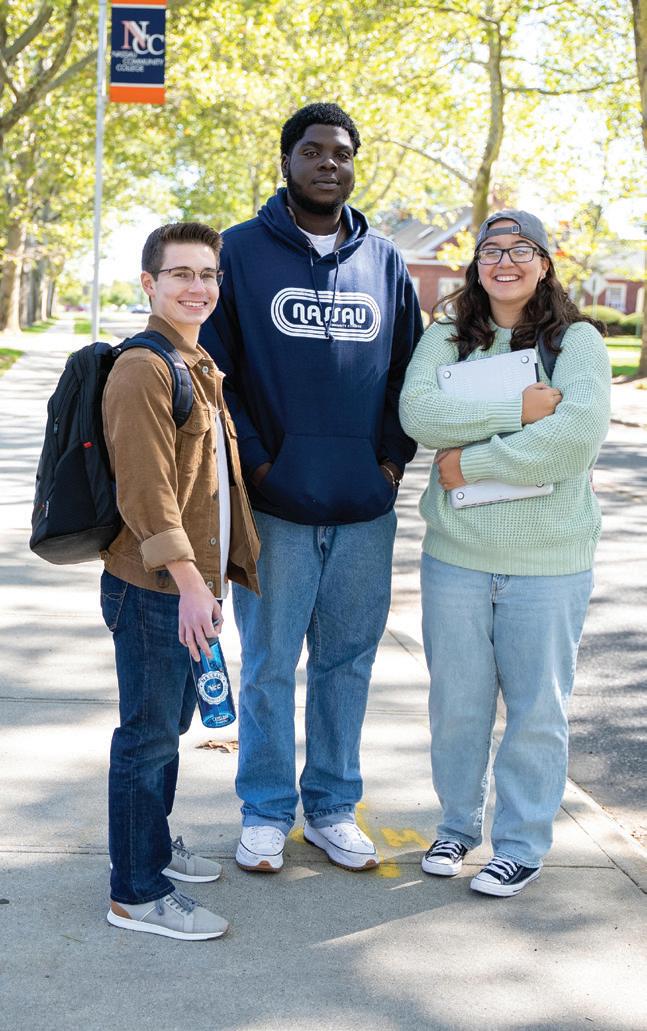
teams and 80 academic, cultural, religious, political, and athletic clubs. Programs like the First-Year Experience connect students to our diverse community, faculty, and one another, fostering a sense of belonging from day one.
financing your college education is as straightforward as possible. Launching an educational journey at NCC means you receive a toptier education without the burden of debilitating debt.
NCC students learn from awardwinning faculty, many of whom also teach at private, four-year universities. NCC faculty bring a depth of knowledge and real-world experience to the classroom. With small class sizes, personalized attention, and faculty who know students by name, you’ll receive the mentorship and guidance needed to excel. And with access to 70 associate degrees and certificates in high-demand fields, you’ll find a desired area of study to expand your skills. Our access to high-
Join a vibrant cultural and social environment that feels more like a traditional college campus. Our prime location provides immediate access to transportation, shopping, dining, and recreation, as well as unparalleled proximity to NYC for internship and career opportunities. Beyond academics, our thriving community life includes more than 20 NJCAA
NCC is where momentum starts with one step forward.
Visit ncc.edu/herald to learn more.
























